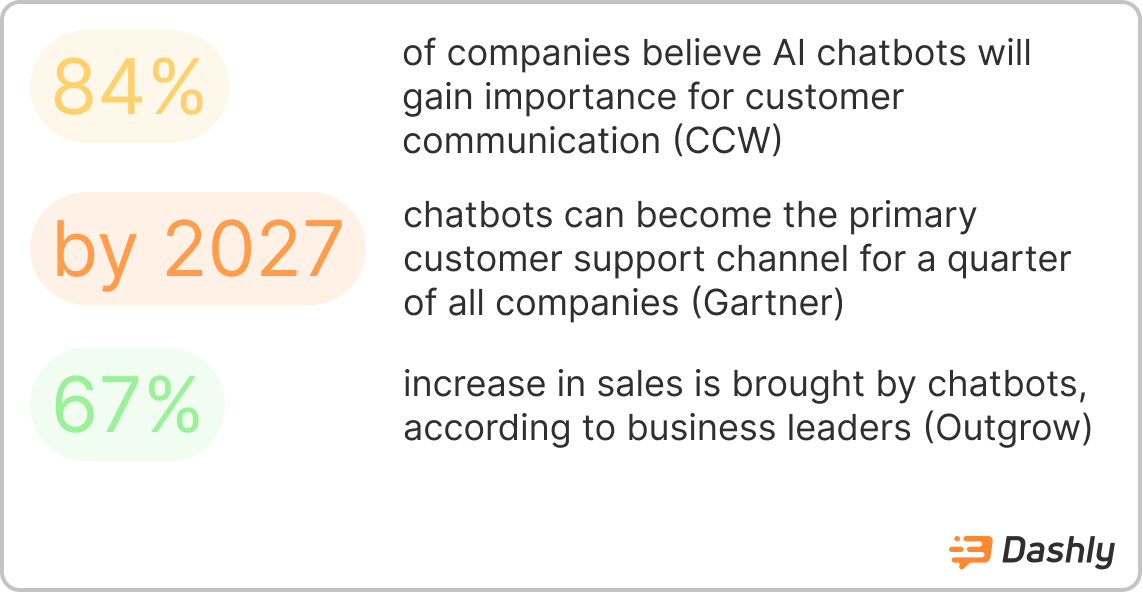15 AI Trends in Sales to Watch (2023)
In this post we deep dive into the top 15 trends redefining and supercharging sales.

Today, it's all about leveraging AI to supercharge sales strategies.
From pinpointing customer insights to crafting pricing strategies, AI isn't just enhancing the sales game—it's redefining it.

Keep reading to learn about the top 15 trends in this space and learn how ai is super charging sales:
1. Lead Scoring:
Using AI to rank potential customers based on their likelihood to convert, helping sales teams prioritize their efforts.
This is particularly helpful for companies implementing a ABM (Account based marketing). With AI-driven insights, companies can tailor their marketing and outbound sales efforts towards high-value accounts, ensuring that resources are allocated to leads with the highest conversion potential. Ultimately optimizing both time and money.
2. Chatbots and Virtual Assistants:
Automating initial customer interactions on websites or platforms, helping in lead capture and answering basic queries. Chatbots are great for quick answers without having to get on a sales call or book time with a sales rep for simple questions.
Here are some stats on companies currently using chatbots and planning to use chatbots:

3. Predictive Analytics:
Analyzing historical data to forecast sales trends, which aids in sales strategies. By analyzing historical data and identifying patterns, AI-driven predictive analytics can forecast future sales trends, customer behaviors, and potential revenue streams. This enables businesses to make informed decisions, optimize their sales strategies, and allocate resources more efficiently.
For instance, sales teams can prioritize leads that are more likely to convert, tailor marketing campaigns to specific customer segments, and anticipate inventory needs based on predicted demand. Predictive analytics can also help in identifying potential upsell or cross-sell opportunities.
4. Personalized Sales Campaigns:
AI can help tailor marketing campaigns to individual preferences, enhancing conversion rates.
According to Gong organizations who get personalization right reduce acquisition costs by as much as 50%, lift revenues by 5% to 15%, and increase the efficiency of marketing spend by 10% to 30%.
5. Email Optimization:
AI can determine the best times to send emails, suggest content changes, and even automate follow-ups based on user interaction.
By leveraging AI, businesses can analyze vast amounts of data to predict the best times to send emails, segment their audience more effectively, and personalize content to resonate with individual recipients. This personalization can lead to higher open rates, increased engagement, and ultimately, more conversions.
AI can automate A/B testing, allowing companies to quickly determine which email variations performs best. This process ensures that emails are continually optimized for the highest possible return on investment.
6. Sales Forecasting:
Sales forecasting is one of the most crucial aspects for both sales reps and management roles. Using algorithms to predict future sales and revenue can give businesses a clearer picture of their financial future.
AI-driven sales forecasting tools analyze vast amounts of historical sales data, market trends, and other relevant factors to predict future sales with higher precision. By identifying patterns and correlations in the data, AI can provide insights into potential sales opportunities, risks, and areas of growth.
This not only helps businesses in making informed decisions but also in resource allocation, and strategic planning.
According to a report by Algolia, historical sales data is typically complex, and past sales data often varies from quarter to quarter, making AI's role in forecasting even more vital.
The integration of AI in sales forecasting will supercharge the way businesses predict and prepare for the future.
7. Recommendation Engines:
For businesses like e-commerce, AI can suggest products to customers based on their browsing and purchase history.
By analyzing purchase history and trends, these LLMs can suggest products that align with the customer's preferences, thereby increasing the likelihood of a purchase.
For instance, Amazon attributes about 35% of its e-commerce sales to its recommendation system, as mentioned by Mind the Product.
AI-driven recommendation engines not only personalize the shopping experience but also play a pivotal role in driving sales and upsells.
8. Conversational Intelligence:
Analyzing sales calls to provide insights on customer sentiment, call effectiveness, and areas for improvement.
Zoom just launched AI Meeting summaries.
By recording and scrutinizing sales interactions, CI tools can identify keywords, topics, and patterns that indicate customer pain points, objections, and sentiments about products or competitors.
For instance, CallRail emphasizes that businesses utilize conversational intelligence to expedite the review process of calls and gather crucial data about their sales methodologies.

Harnessing the power of AI conversational intelligence, companies can refine their sales strategies, enhance customer interactions, and boost overall sales performance.
9. Upselling and Cross-selling:
Predicting which additional products or services a customer might be interested in based on their behavior and purchase history.
Upselling and Cross-selling are often overlooked strategies for businesses to maximize their revenue from existing customers. AI can analyze a customer's purchase history, preferences, and interactions to suggest products or services that they are more likely to be interested in.
A report from POWR mentions that AI is revolutionizing how businesses approach upselling and cross-selling by studying, identifying, and predicting based on data and patterns.
AI-driven upselling and cross-selling not only enhance the shopping experience but also play a pivotal role in driving additional sales and revenue for businesses.
10. Automated Data Entry:
Data entry is the biggest pain points for most sales reps. In fact, according to a recent study by Versational, two-thirds of all sales reps admitted to not logging customer interactions consistently.

AI tools can automatically update CRM systems, reducing manual data input and minimizes the risk of human errors. AI-driven automated data entry is not just a convenience, but a necessity for businesses aiming to optimize their CRM systems and understand their data.
11. Price Optimization
Price optimization, backed by Artificial Intelligence (AI), is a game-changer for businesses aiming to set the most competitive and profitable prices for their products or services.
By analyzing factors such as market demand, competitor prices, customer behavior, and historical sales data, AI-driven tools can suggest the best pricing strategy tailored to maximize revenue and market share.
An example is Google Cloud Blog highlighting the use of Vertex AI for demand forecasting and price optimization.
Companies like PROS and Revionics offer AI-powered price optimization software that empowers businesses to set prices with clarity and confidence.
AI-driven price optimization is not just about setting the right price but about understanding the market dynamics and customer preferences to ensure business success.
12. Customer Insights:
Diving deeper into customer behavior, needs, and preferences to provide more tailored solutions and improve customer relationship management.
By diving into customer behavior, needs, and preferences, AI-driven tools can provide more tailored solutions, enhancing the overall customer experience.
For instance, Salesforce, highlights how CRM systems help companies stay connected to customers, streamline processes, and improve profitability. Furthermore, an article from Commercient discusses the role of AI in enhancing the analysis and interpretation of data to provide meaningful insights in CRM. In essence, AI-driven customer insights not only personalize interactions but also play a pivotal role in strengthening customer relationships and driving business growth.
13. Sales Playbooks:
Sales Playbooks, enhanced by AI, serve as tools for guiding sales reps on the best practices and strategies tailored to specific scenarios or customer segments.
These playbooks, provide actionable insights and step-by-step guidance, ensuring that sales reps approach potential customers with the most effective and informed strategies.
For instance, a report from Gartner predicts that 75% of B2B sales organizations will augment their sales playbooks with AI-guided selling. This integration of AI into sales playbooks allows companies to invest in machine learning technology to analyze data and refine sales strategies.
Platforms like Highspot, leverage AI to suggest the best content for sellers, replacing guesswork with data-driven decisions.
AI-driven sales playbooks not only streamline the sales process but also ensure that sales reps are equipped with the most effective strategies to drive conversions and foster customer relationships.
14. Contract Analysis:
Legal can be one of the biggest bottlenecks when closing a deal. Contract analysis, enhanced by AI, is changing the legal and business landscape by offering a more efficient and accurate way to review contracts.
AI-driven tools can swiftly scan contracts and highlight crucial clauses, ensuring both accuracy and compliance with legal standards.
For instance, a report from CLOC emphasizes that contract search and analysis powered by AI significantly reduces the manual effort, time, and expenses traditionally required for contract review.
DocuSign Insight offers intelligent analysis of agreements using AI, providing a comprehensive view of contractual obligations. Another platform, DFIN, elaborates on how AI contract analysis works, highlighting its ability to save time, effort, and money. While, Kira Systems empowers legal teams with AI-powered contract analysis, ensuring efficient and precise contract reviews.
AI-driven contract analysis not only streamlines this once manual process, but also mitigates risks associated with manual errors and oversights.
15. Training and Onboarding:
Training and onboarding of new sales representatives is a critical aspect of ensuring the success and productivity of a sales team. With the integration of AI the process can been significantly enhanced, offering more effective and efficient training modules.
AI-driven simulations and training modules can provide real-time feedback, adapt to the learning pace of the individual, and offer personalized training experiences.
Companies such as Zenarate recently raised funding to tackle this problem:

This report by Dooly highlights that sales training helps representatives learn new techniques, improve their sales skills, and stay updated with the latest trends.
Platforms such as Mindtickle and Wonderway use AI to understand the needs of the sales team and offer data-driven training solutions.
AI-driven training and onboarding not only accelerate the learning curve for new sales reps but also ensure that they are well-equipped with the knowledge and skills required to excel in their roles.
Conclusion
As we've journeyed through the landscape of AI in sales, one thing is clear: the future of selling is not just about human intuition but pairing it with AI
Using AI, companies are not just staying competitive; but also helping their sales teams be more efficient.




